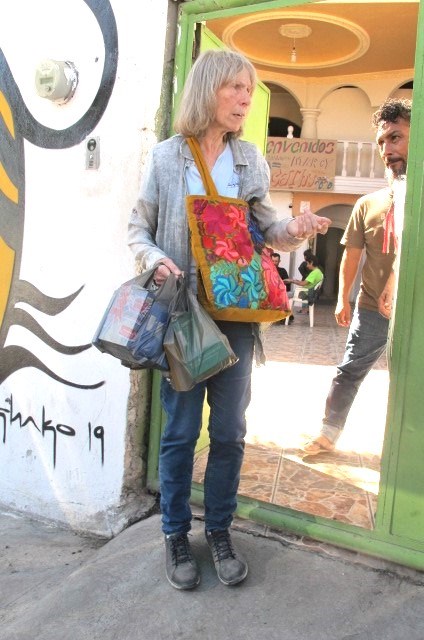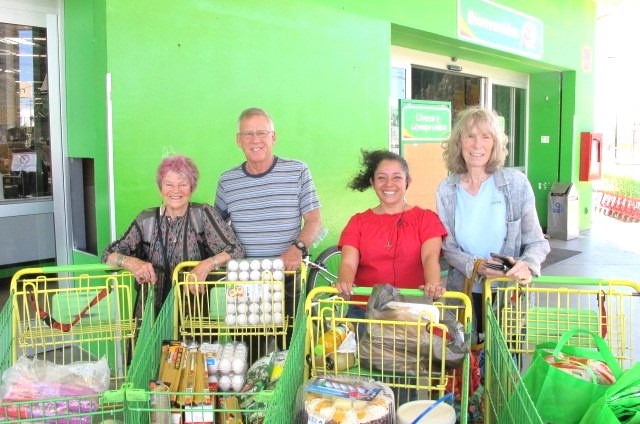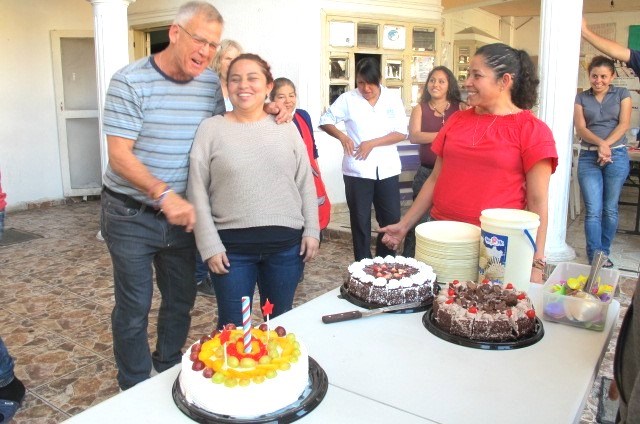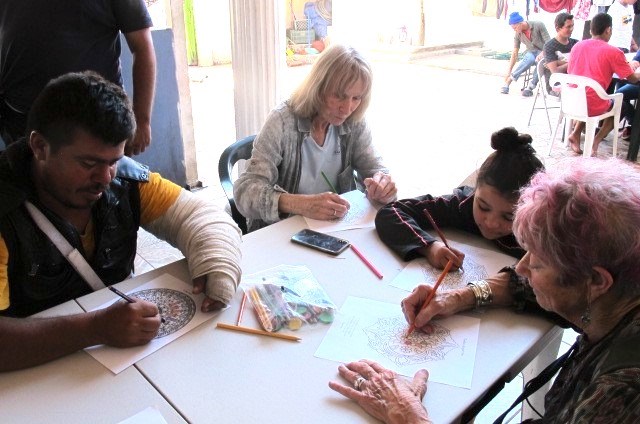I have been visiting San Miguel de Allende for some years now, as have several others from Bowen Island. For those of us who come for extended visits, there comes a time when one feels the need to give something back for the pleasure of spending time in this heritage city, known for its arts and culture.
There is often a certain synchronicity here, where things fall into place by meeting the right people.
This year I volunteered for an event around the migrant situation in Mexico, and met Stan Allen, who for two and a half years has been volunteering at ABBA house, a safe communal home for migrants. At this event we ran into Dr. Ellen Coburn of Bowen Island and I found out that she had been accompanying Stan twice a week for several months to administer medication and check other medical needs. This created a desire for me to go with them to check out this place.

ABBA House in Celaya has housed thousands of migrants on their dangerous journey, either to the U.S. or their return to the homes they had to flee due to corruption, violence and poverty. All north/south trains pass through Celaya and many ride the trains, nicknamed La Bestia. Often the migrants find their way to ABBA House for a few days of refuge.
Those who are still able-bodied can stay for three days, where they receive nurturing care; others who are sick or injured are taken care of until they are able to resume their journey, which is full of obstacles and dangers. All who arrive have experienced hardships, and many arrive with injuries, including amputations, sometimes after falling off the train and sustaining horrendous injuries. Many have infected blisters from walking many miles. All arrive traumatized, exhausted and red-eyed with the dust from the road.
By road from San Miguel, it took us a little over an hour to reach the house on a dusty street in Celaya. On arrival we entered the always-locked metal doors. Stan introduced to the mostly volunteer staff. Angie, who registers new arrivals, was sorting through a pile of clothes. (Abba provides shoes, backpacks, socks, underwear, medications, new and used clothing and personal hygiene products.) I met the kitchen staff and other volunteer workers. I was then introduced to the migrants Stan was familiar with. (People come and leave on a daily basis.) At the time of my visit, the majority of them were Hondurans. While I was learning the lay of the land, Ellen quietly disappeared into the infirmary to attend to all the medical needs.
In the film Where Can We Live in Peace by Canadian filmmaker Judy Jackson, there is much on the work of ABBA House. In one part, nurse Amparo Pasahondo says about Ellen, “She’s the first doctor who has come and helped us. Mostly it’s really hard, we have to take patients to the hospital and then it is hard to get seen. Often we come back without being seen. Ellen is so much help, she has brought medicines as well. Really she has been a blessing and there has been a big change at ABBA.”
Due to limited Spanish I was able to talk with only one migrant. As an amputee, Alan had been at the house for some months, waiting for his prosthesis. He had lost part of one leg falling off the train. He happily spoke with me to practice his English and proudly told me it was his daughter who taught him. Most of his family are still back in Honduras. It was a friendly chat and he was also curious about me. This man who must have suffered terribly in life kept smiling as we talked and still had a twinkle in his eye. Later Stan told me that he had not told his family about losing part of his leg.

When Ellen reappeared, Stan said it was time to shop for a week’s groceries. With Magali, one of the cooks, the four of us set out for a nearby supermarket. With a list and a quick wander around the aisles, we soon filled up four carts. Ellen bought more medical supplies. Angie had a birthday coming up in a couple of days, so four large cakes sat on the top of a one of the carts. When we arrived back, Stan called for volunteers to help unpack the groceries. A train of young men quickly carried everything into the house.
ABBA House is the brainchild of Pastor Ignacio Martinez Ramirez, a truly compassionate man. In Judy Jackson’s film, he is seen bathing the blistered feet of a migrant. He tells how he and his family originally started by taking food to the migrants on the trains, but with the strong feeling they were not doing enough. With time and much work, they raised money to rent a place, which is the present ABBA House. Pastor Ignacio’s mission, and that of the team he has built, is to provide each person with three nights of safe, fear-free rest, healthy food, showers, fresh clothes, legal assistance and medical attention. His daughter Abril, a psychologist, offers emotional support.

Pastor Ingnacio greeted me warmly and I could feel this was a man who treats all as equals. As I left his office with Stan, we ran into Austen, a 17-year-old migrant from Honduras. He gave me a big embracing hug (something I would not experience in Canada with a 17-year-old boy.) Stan told me his story. When he was 14 years old, Austen was traveling there with his two cousins. Their father, his uncle, was already in the U.S. When they reached the border, his uncle told him that he could not be responsible for him. As a strong, attractive teenager, the dangers at the border were so great that he decided to turn back. On his journey back he auspiciously found ABBA House. Pastor Ignacio was impressed with Austen’s demeanor and the pastor and his family decided to adopt him. When I met Austen he had just returned from school. As a friendly teenager he is very much part of the communal house.
Stan always brings word games, puzzles and ping pong balls etc. to keep the people engaged and later in the afternoon Ellen and I joined in, coloring mandalas. As I sat surrounded by these migrants, I was aware of my privilege. I was aware that if I were born in their country, I would most likely be completely in their position. As Stan said, “They are all good people, just wanting to make a better life for themselves and their families.”
My visit to ABBA House, with its community spirit and resilient people, will remain with me for a long time. They represent for me the millions of migrants worldwide who are forced to leave their homes due to corruption, violence, environmental devastation and poverty.
Later this year Ellen and I would like to do a presentation on Bowen Island and Judy Jackson is willing to show her film. Judy and I agreed that although these migrants are nearer to Canada than many others, we hear less about them than others from distant lands.
ABBA House relies solely on the big hearts of those who respond to the need of this vulnerable population and understand the complete random chance of where you happen to be born. If moved please make financial gifts to assist with the mission of ABBA house at the following link: gofundme.com/f/abba-house-shoes-for-immigrants.



